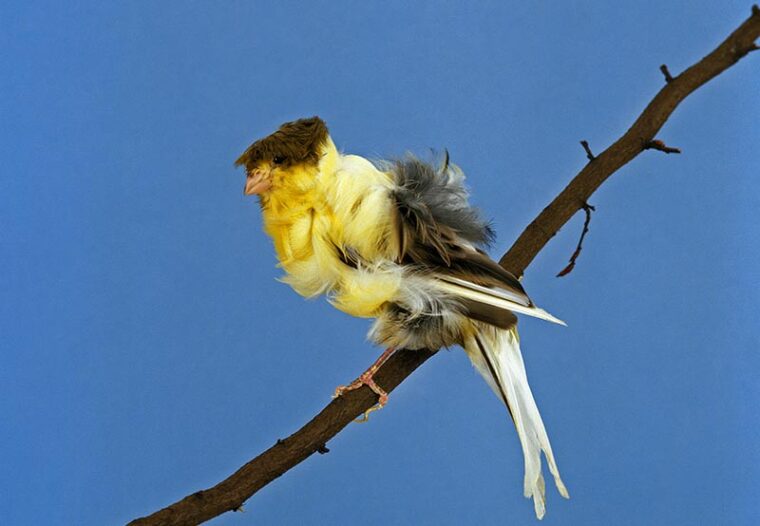
For anyone looking for a unique and vibrantly colorful pet bird, the Frilled Canary is a great choice. This breed is a unique species of canary that stands out from other pet birds due to its bright colors and distinct frilled feathers.
Not only is this bird a stunning addition to any home, but it’s also an intelligent and sociable pet that can learn to perform tricks and respond to its owner’s commands. Overall, the Frilled Canary is an active bird that loves to explore and play, making it an ideal companion for anyone looking for an entertaining and interactive pet.
Species Overview

| Common Names: | Frilled Canary, Dutch Frilled Canary, Parisian Frilled Canary |
| Scientific Name: | Serinus canaria domesticus |
| Adult Size: | 7 – 7.9 inches, 0.4 to 1 ounce |
| Life Expectancy: | 10-12 years |
Origin and History
The Frilled Canary is thought to have originated from the wild canary and was first developed in the late 1800s in Germany. They were initially known as “Dutch” canaries in the beginning. However, over the next century, many versions of the breed emerged from different parts of Europe. These many different versions are thought to be the result of a genetic mutation that occurred in the Dutch breed and resulted in the unusual “frilled” appearance of the feathers.

Temperament
The Frilled Canary is an intelligent bird that can be taught to perform tricks and can even recognize its owner’s voice. It is also very active and enjoys hopping around in its cage and playing with toys.
This bird is social and loves to be around people and other birds. It loves to explore and play, making it an entertaining and interactive pet. Owners of this bird species are also surprised to find that it is a rather friendly bird that loves to be held and petted, and it can even recognize its owner’s voice and respond to commands.
Note that these birds can be a bit louder than other types of pets. So, while you can teach your Canary to sing, you may find it annoying to hear it singing at 6:00 in the morning or at night when you’re trying to get some rest.
Speech & Vocalizations
The Frilled Canary is a vocal bird that loves to sing, although its songs are not as loud or complex as other canaries. Its songs are usually short and sweet, with some birds even being able to imitate human voices. You’ll find that these birds are quite intelligent and love to communicate with their owners. With consistent training, filled canaries can also learn to imitate human voices.
Frilled Canary Colors and Markings
The Frilled Canary is a small to medium-sized bird with a length of around 5 inches and a weight of around 1.5 ounces. Its body is slender, and its wings are long and pointed, giving it a graceful and elegant silhouette. This canary species has distinctive frilled feathers on its back and sides that give it a unique appearance.
These feathers are usually white or yellow in color, although there are some varieties that can have red or orange frills. Most of these canaries have bright yellow feathers on their head, back, and wings, with varying shades of yellow on their chest and stomach.
Caring for the Frilled Canary
The Frilled Canary is a hardy and resilient bird, but it still needs proper care and attention in order to thrive. One of the most important aspects of caring for this bird is providing it with a clean and spacious cage. The cage should be large enough to allow the bird to move around and exercise, and it should be equipped with perches, toys, and ladders. The cage should also be placed in a quiet area away from direct sunlight and drafts.
On average, these canaries will eat about 1 or 2 teaspoons of feed per day. You’ll find that they will only generally eat the top layer of their food tray, so if it seems like your Canary is done eating, be sure to empty out any remaining hulls. You should also make sure to switch up their food sources so that they get a wide range of nutrients for a balanced diet.
Common Health Problems
Frilled Canaries can be prone to certain health issues, so it’s essential to be aware of these common health issues and take the necessary steps to protect your bird’s health.
Stress
One of the most common health issues for domestic canaries, believe it or not, is stress. This can be caused by overcrowding, improper diet, lack of exercise, and even boredom.
Stress can lead to a weakened immune system, which can cause a variety of other illnesses. To prevent this, be sure to give your canary enough space and to provide a varied diet that is high in vitamins and minerals. Additionally, giving your bird plenty of toys (like ladders, swings, and tubes) and playtime can help to reduce stress.
Respiratory Problems
Another common health issue for domestic canaries is respiratory diseases. These can be caused by allergens, air pollution, and even poor air quality. Signs of respiratory diseases can include sneezing, coughing, and difficulty breathing. To prevent respiratory diseases, ensure that your bird is in a clean and dust-free environment. Additionally, it is important to make sure that the air quality in your home is not too dry and that you don’t spray any air fresheners or perfumes or have any diffusers or lit candles near the cage.
Infections
Finally, canaries can be prone to parasites and other infections. Parasites can cause a variety of health problems, including poor nutrition, weight loss, and even death. To prevent parasites, it is important to keep your bird’s cage clean and to keep it away from wild birds. Additionally, it is important to use an appropriate anti-parasite medication as recommended by your veterinarian.
By taking the necessary steps to protect your canary’s health, you can help to ensure that your bird remains happy and healthy for many years to come. Be sure to watch for any signs of illness and contact your veterinarian immediately if you see any signs of distress.
Diet and Nutrition
The Frilled Canary is an omnivore, and its diet should consist of fruits, vegetables, and seeds. A good diet should include a variety of fresh fruits and vegetables such as apples, pears, grapes, carrots, and spinach, as well as a high-quality seed mix that is specifically designed for canaries.
These birds should also be given treats such as mealworms and millet sprays. It’s also important to provide a clean and fresh water source for the canary (such as a water feeder in its cage) and to make sure that its food is changed daily.
Exercise
Though these small birds don’t quite require the same type of exercise as other pets such as dogs and cats, they do need to stretch their wings and move around to stay healthy. They have a few basic exercise requirements.
The most important exercise requirement for a domestic canary is plenty of space to move and fly. Canaries are very active birds and need space to fly and exercise their wings. The actual ideal dimensions for an indoor enclosure are at least 3 feet wide, 2 feet deep, and 6 feet high. If possible, the enclosure should be even larger with plenty of perches, bridges, toys, and other items to keep your canary entertained.
In addition to space, canaries also need exercise outside of their enclosure. This can be done with a flight cage. Flight cages provide an even larger space for your canary to fly and exercise. These cages are typically bigger and may not be suitable for people living in apartments. If that’s the case, your canary should be allowed at least an hour of supervised exercise outside of their enclosure each day.
 Where to Adopt or Buy a Frilled Canary
Where to Adopt or Buy a Frilled Canary
There are several places you can adopt a Frilled Canary from. One popular option for adopting a canary is from a pet store. Pet stores (such as Petco) typically breed canaries specifically for sale and employ knowledgeable staff to help you make the right decision.
Pet stores also often have a wide selection of canaries, so if they don’t have a Frilled Canary at the moment, you can choose one that best suits your home environment or wait until they have one. But know that pet stores often have a high turnover of birds, so you may have to act quickly if you find the perfect canary.
Another option for adopting a canary is from a rescue center or a private breeder. Rescue centers will often take in canaries that have been surrendered by their owners and provide a safe environment for them to be rehomed. Private breeders may also have canaries available for sale, which is the best way to get a Frilled Canary specifically.
Summary
Purchasing a pet canary is a wonderful way to bring a splash of color and song into your home. Frilled Canaries are beautiful, vibrant birds that require minimal care and attention. Not to mention, their cheerful chirps bring a smile to anyone’s face. Canaries are also very low maintenance and inexpensive to care for. So, if you’re looking for a pet that’s easy to take care of, affordable, and pleasant to be around, these amazing birds may be worth looking into.
Featured Image Credit: slowmotiongli, Shutterstock










